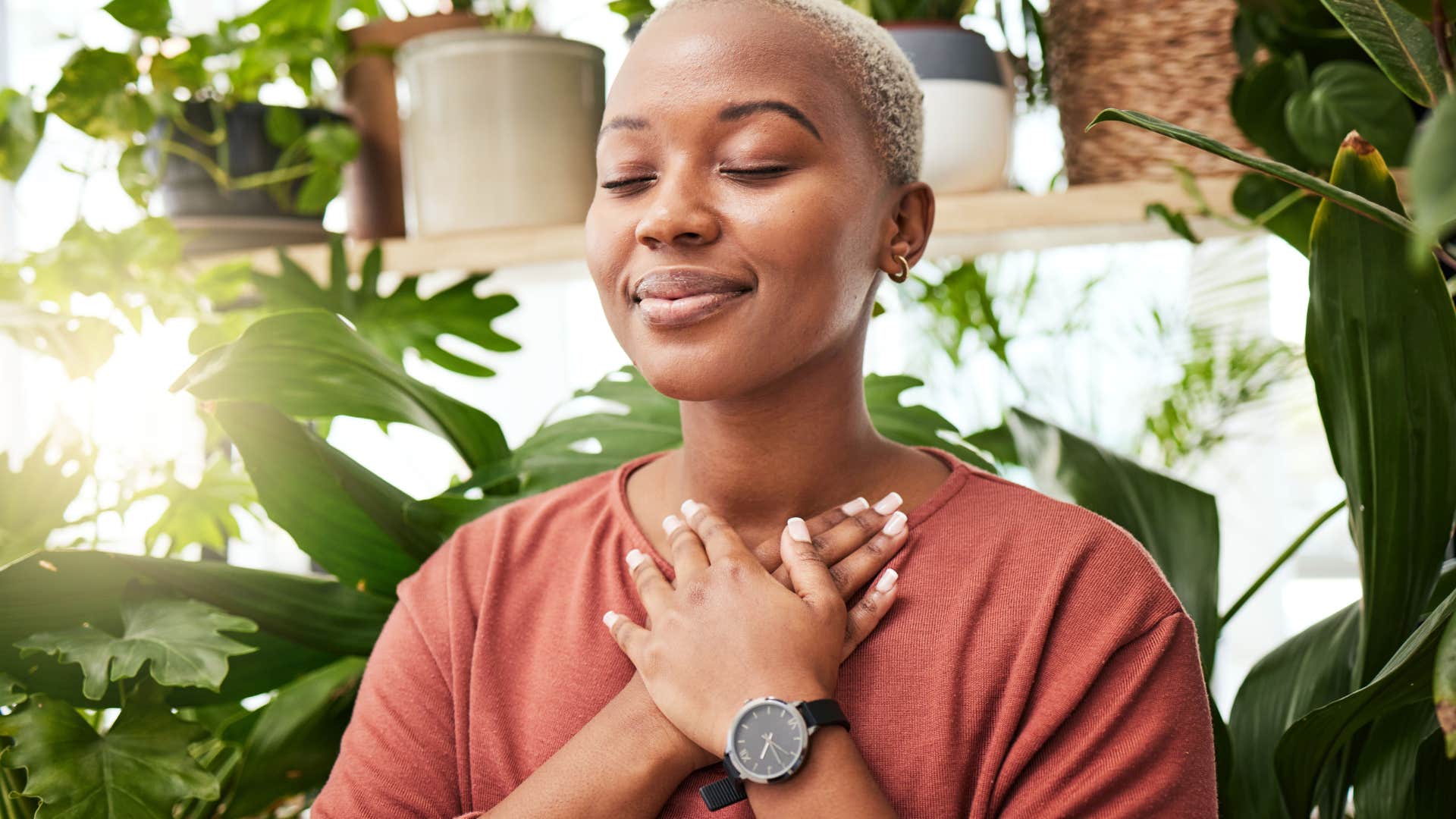Here Are 6 Magic Habits That Make People Feel Happier About Life, According To Experts
Six habits proven to boost happiness and make life feel a little bit lighter.
 Maeva Vigier | Unsplash, ROMAN ODINTSOV | Canva
Maeva Vigier | Unsplash, ROMAN ODINTSOV | Canva We know that we need to take care of our physical health, but mental health often takes a back seat. Today’s world is full of stress, anxiety, depression, and worry, and being happy is more difficult than ever.
But, all hope isn’t lost because the secret to happiness and good mental health often lies in our daily self-care routine. While the practice of self-care will look different for everyone, the basic definition is "the practice of taking action to preserve or improve one's own health."
If you want to feel happier about life, there are a few little changes you can make each day. Here are some tips for how to improve your mental health by making a few daily tweaks to the way you live.
Here are six magic habits that make people feel happier about life, according to experts:
1. Start the day off on a positive note
 insta_photos / Shutterstock
insta_photos / Shutterstock
Stephanie Roth Goldberg, a licensed clinical social worker, says it’s key to start the day on a positive note by maintaining a healthy morning routine. This could mean allowing some self-care time to relax with your coffee for a few minutes before leaving the house or getting some physical activity in before work.
“It’s helpful to not always feel that you wake up and go right to work,” Goldberg says. “Choosing what feels good in the morning is a great way to start the day and implement a routine.”
2. Keep stress-relievers on hand
 Andrey_Popov / Shutterstock
Andrey_Popov / Shutterstock
Goldberg also recommends keeping something to relieve stress on hand at work or in your bag. “[It’s] a nice way to remember you have ‘tools’ to help you relax when needed,” she says, noting that examples include an essential oil stick, a favorite type of tea, or a soothing hand cream.
Comfort objects act as a container for negative emotions, allowing you to process difficult feelings in a safe way. One study found that the heart rate of participants who reached for their comfort item during a stressful event lowered, indicating better stress regulation.
3. Take breaks during the workday
 insta_photos / Shutterstock
insta_photos / Shutterstock
“Taking breaks during the workday is essential to everyone’s mental health,” Goldberg explains. Get away from your computer screen by stepping outside for some fresh air — it can do wonders for your concentration and overall mood.
If you don’t have a lot of opportunities to take breaks, Goldberg recommends going for a short walk or even visiting a friend at their desk to help break up the day and feel better.
4. Incorporate 15 minutes of mindfulness into the day
 PeopleImages / Shutterstock
PeopleImages / Shutterstock
Psychologist Dr. Monica Johnson says that 15 minutes of mindfulness “can make a world of difference to your day.” Johnson recommends doing this in five-minute increments three times a day. In the morning, she advises her patients to do five minutes of deep breathing and to “set intentions for having a positive day.”
In the middle of the day, she suggests taking another five minutes to reset the brain, feel happier, and shake off some of the stress that may have built up already.
“This can include taking a lap around your office building while listening to a walking meditation on an app or rubbing a scented lotion on your hands and taking a few deep breaths to re-center,” Johnson adds.
At night, take another five minutes of mindfulness to relax your mind — it’ll help you get to sleep more quickly too. Johnson suggests using an adult coloring book or listening to nature sounds during your nighttime mindfulness session.
5. Designate screen-free time during the day
 Ground Picture / Shutterstock
Ground Picture / Shutterstock
Goldberg explains that designating a time during the day when you completely disconnect from screens is “a great mental health tool that people don’t utilize.”
Although it’s commonly recommended to disconnect before bed, Goldberg emphasizes that it’s healthy to do this at any time of day. “Spending time away from screens allows for creativity, connection, and feelings that otherwise would not happen,” she says.
Regular breaks allow the brain to slow down and refocus, which can improve your concentration. Research has connected high screen use to less emotional stability.
6. Establish a solid bedtime routine
 Hananeko_Studio / Shutterstock
Hananeko_Studio / Shutterstock
Getting enough high-quality sleep is an essential self-care practice for our mental and physical health, and Katie Leikam, a licensed clinical social worker, recommends establishing a nighttime routine to ensure you get the shut-eye you need. Wash your face, put down your phone, and turn off your lights at the same time every night.
“This will help you obtain better sleep, which is one of the best things you can do for your mental health,” Leikam explains.
The good news is these changes are totally doable, but could make a big impact when it comes to your mental health and overall happiness. It’s worth giving them a shot — the only thing you have to lose is some stress.
Caitlin Flynn is an award-winning journalist, writer, and editor whose reporting and essays have been featured in publications including Rolling Stone, The Seattle Times, Teen Vogue, InStyle, Glamour, Allure, Refinery29, Lonely Planet, and more.

